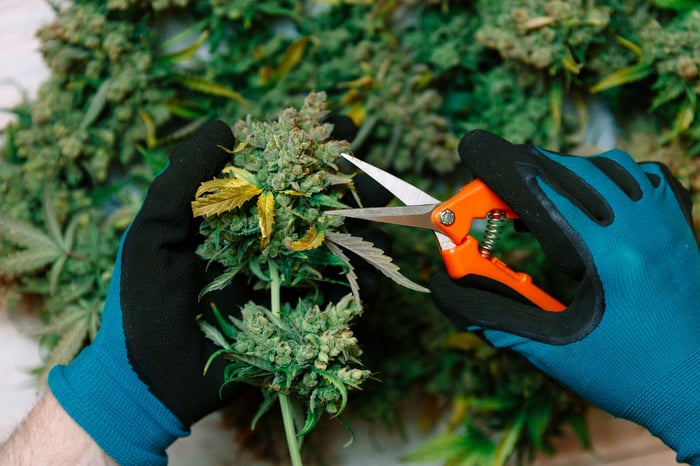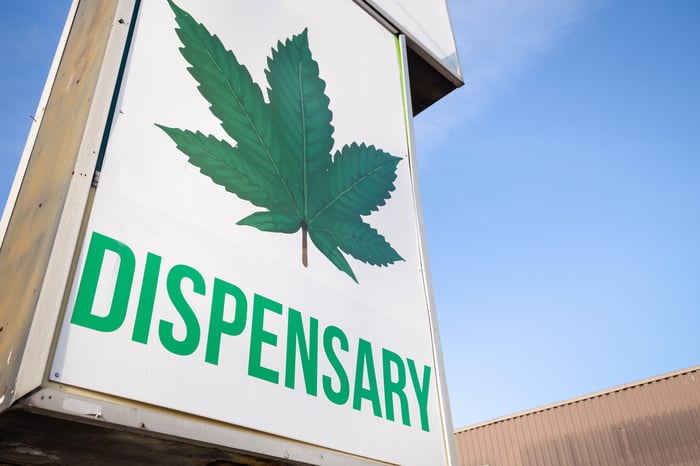A year ago, the marijuana industry was just a couple weeks removed from an all-time high. On Oct. 17, 2018, legal weed was launched in Canada, with the expectation (at the time) that derivative products would be given the green light no later than the following October. In essence, Wall Street and investors expected a quick uptake of cannabis products and a rapid move to profitability for marijuana stocks.
However, expectations have not met reality. Our northern neighbor has seen its marijuana supply constrained by regulatory agency Health Canada's inability to work through a massive backlog of licensing applications, while certain provinces (ahem, Ontario) have been particularly slow to roll out physical dispensaries. Similar problems have been observed in the U.S., with high tax rates the lead culprit. The end result has been a resurgence of black-market marijuana sales and the collapse of cannabis stocks.
Just how bad have things gotten for pot stocks? Well, at least three currently have market caps that are lower than their projected sales for the coming year -- that is, with a forward price-to-sales (P/S) ratio below 1 -- which is an oddity for such a high-growth industry.

Image source: Getty Images.
KushCo Holdings: Forward P/S of 0.76
Although it's an ancillary player, KushCo Holdings (KSHB) has seen its stock get clobbered in 2019, despite the fact that the company has stood by its current-year sales forecast on a number of occasions. That's led to KushCo now being valued at just 0.76 times next year's consensus sales, according to Wall Street.
Why isn't KushCo commanding a higher multiple? The biggest reason looks to be the company's reliance on vaporizers to generate the bulk of its sales. KushCo does have two other means of generating revenue. It provides hydrocarbon gases that are used in the production of cannabis oils, and also has a burgeoning packaging and branding solutions business that should thrive as the global pot industry expands. But for the time being, vaporizers are the key source of sales -- and that's troubling for two reasons.
First, KushCo sources its vaporizers from China, which is a problem given that these vaporizers have had tariffs placed on them. There doesn't appear to be any long-term U.S.-China trade deal in the cards, which suggests that tariffs could remain a looming issue. Thankfully, KushCo has made the decision to stop eating these higher costs and, instead, raise its prices for vaporizers.
The second issue stems from vape-related health concerns in the United States. According to the Centers for Disease Control and Prevention (CDC), 1,888 confirmed or probable cases of vape-related mystery lung illnesses have been reported in recent months, including 37 deaths. While the CDC is still investigating the cause of these mystery lung illnesses, it has recommended that users not vape products with tetrahydrocannabinol (THC), the cannabinoid that gets users high.
While I do believe KushCo has the tools to weather this near-term storm, the ride may very well remain bumpy.

Image source: Getty Images.
Sundial Growers: Forward P/S of 0.97
Another relatively cheap pot stock, at least based on forward sales, is Sundial Growers (SNDL -3.38%). This Canadian grower has a market cap of $300 million, but is forecast to generate $309 million in sales next year, per Wall Street.
Why is Sundial getting no respect, you wonder? Part of the reason has to do with the noted supply issues in our neighbor to the north. The slow rollout of physical retail stores isn't leaving cannabis growers with nearly enough outlets to sell their product. Additionally, Statistics Canada found that black-market marijuana was 45% cheaper per gram than legal-channel weed during the third quarter. This makes it very difficult for growers like Sundial to compete.
Furthermore, Sundial Growers has also seen its cannabis quality come into question. More specifically, there have been lawsuits filed regarding a half-ton of marijuana "returned" by Zenabis Global for impurities. For what it's worth, Sundial reports that the returned cannabis accounted for only a small fraction of the order, but the company is still left defending itself against these allegations.
Maybe the most troubling aspect for Sundial is that a good portion of its sales have come from wholesale bulk sales. In other words, rather than selling to provinces, it's selling its product to other marijuana growers and pot companies. This is a nice means of unloading marijuana over the short term, but it's a lower-margin means of generating revenue, and it probably won't be sustainable over the long run after Canada's supply issues are dealt with.
Don't get me wrong, Sundial Growers may very well be cheap here. However, it has some hurdles to leap before it proves itself to Wall Street.

Image source: Getty Images.
MedMen Enterprises: Forward P/S of 0.39
Lastly, there's MedMen Enterprises (MMNFF), which has easily been one of the worst-performing cannabis stocks in 2019. With nearly $487 million in sales forecast for next year, according to Wall Street, this places MedMen at less than 0.4 times next year's revenue.
The primary reason MedMen gets no respect on Wall Street is because the company is losing a boatload of money. MedMen recognized a $53.3 million loss in the fourth quarter, which was a modest improvement over its previous three quarters. But even with substantive reductions to general and administrative expenses, the company's full-year loss of $231.7 million tops its current market cap. Yuck.
Making matters worse, MedMen recently called off its acquisition of privately held multistate operator PharmaCann. I completely understand its move to do so, given that taking on PharmaCann's existing locations and licenses would have further increased its costs. But this deal, announced in Oct. 2018, was a big reason investors were so bullish on MedMen. Canceling the deal in its entirety demonstrates how dire the company's financial situation really is.
MedMen's weakness can also be explained by California's high tax rates. An aggregate tax rate on legal weed that can reach as high as 45% makes it difficult for retailers like MedMen to compete with illicit growers.
If there were one cannabis stock that I'd strongly urge investors to avoid like the plague, it's MedMen.





